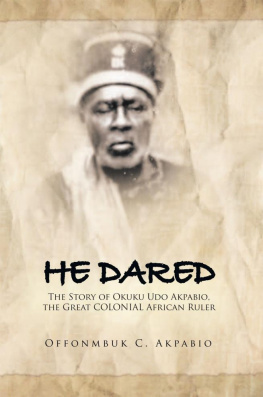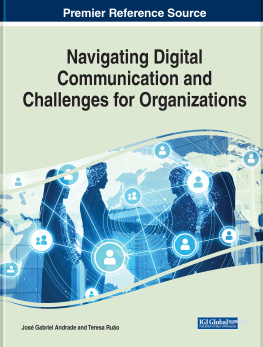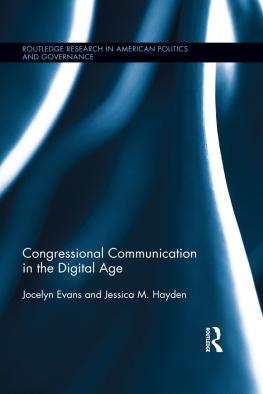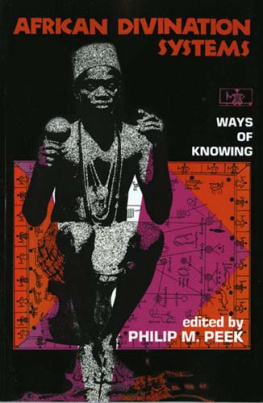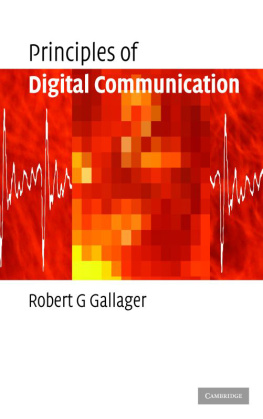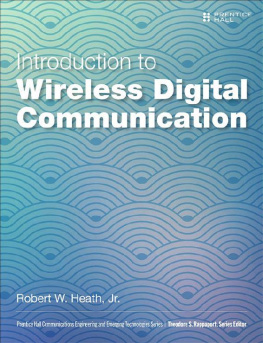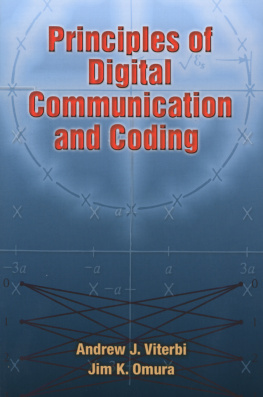Akpabio Eno Ime - African Communication Systems and the Digital Age
Here you can read online Akpabio Eno Ime - African Communication Systems and the Digital Age full text of the book (entire story) in english for free. Download pdf and epub, get meaning, cover and reviews about this ebook. year: 2021, publisher: Taylor & Francis Group, genre: Home and family. Description of the work, (preface) as well as reviews are available. Best literature library LitArk.com created for fans of good reading and offers a wide selection of genres:
Romance novel
Science fiction
Adventure
Detective
Science
History
Home and family
Prose
Art
Politics
Computer
Non-fiction
Religion
Business
Children
Humor
Choose a favorite category and find really read worthwhile books. Enjoy immersion in the world of imagination, feel the emotions of the characters or learn something new for yourself, make an fascinating discovery.
- Book:African Communication Systems and the Digital Age
- Author:
- Publisher:Taylor & Francis Group
- Genre:
- Year:2021
- Rating:4 / 5
- Favourites:Add to favourites
- Your mark:
- 80
- 1
- 2
- 3
- 4
- 5
African Communication Systems and the Digital Age: summary, description and annotation
We offer to read an annotation, description, summary or preface (depends on what the author of the book "African Communication Systems and the Digital Age" wrote himself). If you haven't found the necessary information about the book — write in the comments, we will try to find it.
African Communication Systems and the Digital Age — read online for free the complete book (whole text) full work
Below is the text of the book, divided by pages. System saving the place of the last page read, allows you to conveniently read the book "African Communication Systems and the Digital Age" online for free, without having to search again every time where you left off. Put a bookmark, and you can go to the page where you finished reading at any time.
Font size:
Interval:
Bookmark:

The book covers African communication systems, discussing modes and forms of communication across West, East and Southern Africa and comparing them with traditional and new media.
African Communication Systems and the Digital Age contextualizes communication by bringing to the table African contributions to the field, examining the importance of African indigenous forms of communication and the intersection of African communication systems and the digital age. The book covers various concepts, models, theories and classifications of African communication systems, including instrumental communication, types of African music and their communication properties, indigenous writing systems, non-verbal communication, and mythological communication. Through careful analysis of communication in Africa, this book provides insights into the various modes of communication in use prior to the advent of traditional and new media as well as their continued relevance in the digital age.
African Communication Systems and the Digital Age will be of interest to students and scholars of African communication.
Eno Akpabio is a Professor of Information and Communications Studies at the University of Namibia.
First published 2021
by Routledge
2 Park Square, Milton Park, Abingdon, Oxon OX14 4RN
and by Routledge
52 Vanderbilt Avenue, New York, NY 10017
Routledge is an imprint of the Taylor & Francis Group, an informa business
2021 Eno Akpabio
The right of Eno Akpabio to be identified as author of this work has been asserted by him in accordance with sections 77 and 78 of the Copyright, Designs and Patents Act 1988.
All rights reserved. No part of this book may be reprinted or reproduced or utilised in any form or by any electronic, mechanical, or other means, now known or hereafter invented, including photocopying and recording, or in any information storage or retrieval system, without permission in writing from the publishers.
Trademark notice: Product or corporate names may be trademarks or registered trademarks, and are used only for identification and explanation without intent to infringe.
British Library Cataloguing-in-Publication Data
A catalogue record for this book is available from the British Library
Library of Congress Cataloging-in-Publication Data
A catalog record has been requested for this book
ISBN: 978-0-367-25161-1 (hbk)
ISBN: 978-0-429-28839-5 (ebk)
As with many other fields, Western scholarship has attempted to lay full claim to media and communication. And like many scholars of African descent have done in other fields, this book is an attempt at decolonizing media and communication and bringing to the fore the contributions of Africa to the media and communication field. This cannot be done, however, without addressing some misconceptions and untruths.
Africans have a rich heritage which we ought to be proud of. We must not fall into the temptation fostered by legacy media, academic sophistry and popular culture that Caucasians are the master race and everyone else must accept their subjugation. Every part of humanity has made some contribution to our collective progress and wellbeing.
Lets start with civilization to which every ethnic group has added value. Diop has shown convincing evidence of its Black origins, at a time when Caucasians were at a primitive stage of civilization in comparison. Amillineau goes so far as to state that:
Egyptian civilization is not of Asiatic, but of African origin, of Negro origin, however paradoxical this may seem. We are not accustomed, in fact, to endow the black or related races with too much intelligence, or even with enough intelligence to make the first discoveries necessary for civilization. Yet, there is not a single tribe inhabiting the African interior that has not possessed and does not still possess at least one of those first discoveries.
This is precisely why it has proven difficult to find vestiges of Egyptian civilization in Western Asia, which is considered the cradle of the Indo-Europeans. have pointed to glaring similarities between Africa and Egypt in areas such as cosmogony, totemism, circumcision, kingship, social organizations, political organizations, matriarchy, economic organizations and languages.
But the main reason why this task is crucial is not simply to foster a sense of pride among Africans given the present picture, which might not appear rosy when compared to other regions. It is not only to prevent impressionable minds from succumbing to the sustained propaganda that nothing good can come out of Africa. It is not just to break the exotic image of Africa being a place to escape to, which destination marketing has fostered. It is intended to provide a context; a historical and cultural background on which to build and advance.
Given the various attempts at putting down the Black race, marginalization of indigenous African communication was naturally to be expected. There were a number of contributory factors. Even though slavery was not originally race-based, slaves were predominantly Black in the 17th and 18th centuries, and the myth of African racial and cultural inferiority became the rationale for this.
European scholars also compounded the problem. Their scholarship painted Africa as oral and emotional and the European thought system as rational.
African scholars have tried to discard this colonial and prejudiced baggage. A first or major plank of African/Black Diaspora studies involved dismantling this perspective.
African communication scholars are also taking up the gauntlet. Wilson, contesting the narrow use of the word mass posits that:
[to] those who have come to equate the word mass with such concepts as the mass audience or the global village, the application may seem a bit of a misnomer given the image and picture of the large population of people that are often involved in these mass concepts. But we are talking about little communities, clans, villages numbering a few thousands in scattered settlements whose desires are for information machinery that exists with them [emphasis added] For our purpose, the mass medium shall be defined as that through which large numbers of people are reached through any of our traditional [indigenous] mass media, namely eyei, nnukenin, obodom, ntakrok, and others.
Thus, communication and media are moving away from the province of those who think they have exclusive ownership. In fact, the top-down system fostered by the colonialists and adopted by indigenous African leaders was defeatist and served to create silence and non-communication at the grassroots
Communication is at the centre of human experience, and especially indigenous communication. The incontestable fact is that indigenous communication pervades every aspect of our lives as Africans and has continued to march on. For politicians seeking elective office, if they spent a lot of money only on campaigns on traditional and legacy media, they would receive a shock when the results are in. In the same vein, dissemination of development messages without factoring in these indigenous communication modes would be an exercise in futility. No wonder then that almost every department of mass communication in Nigerian universities now teach African communication systems; a realization that the traditional mass media cannot be the be-all and end-all in reaching Africans effectively.
Font size:
Interval:
Bookmark:
Similar books «African Communication Systems and the Digital Age»
Look at similar books to African Communication Systems and the Digital Age. We have selected literature similar in name and meaning in the hope of providing readers with more options to find new, interesting, not yet read works.
Discussion, reviews of the book African Communication Systems and the Digital Age and just readers' own opinions. Leave your comments, write what you think about the work, its meaning or the main characters. Specify what exactly you liked and what you didn't like, and why you think so.


